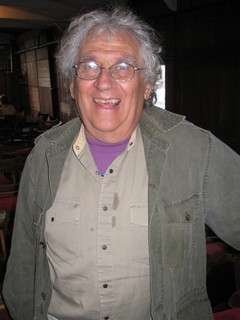|
Back
Variations On An Opening Setting New York
BargeMusic, Fulty Ferry Landing, Brooklyn
07/08/2009 - & July 10, 2009
Adriano Banchieri: Barca di Venetia per Padova
Eric Salzman: Jukebox in the Tavern of Love (Libretto Valeria Vasilevski)
The Western Wind Vocal Ensemble: Laura Christian and Michele Kennedy (Sopranos), William Zukov (Countertenor), Todd Frizzell, Richard Slade (Tenors), Elliot Z. Levine (Baritone/Guitar), Valeria Vasilevski (Stage Direction), Hollie Nadel (Costume styling and Design/Props), Pedro J. Rosaro rl (Stage Presence and Stage Manager) 
Composer Eric Salzman (© Harry Rolnick)
So a penitent nun, a guilt-ridden rabbi, a fixit guy and a dancer walk into this bar……
So a fisherman, a prostitute, a musician, a bookseller and a group of wailing Jews get on this boat going from Venice to Padua……
Both this tavern of losers and this ship of fools are divided by 400 years, but both of them—the first called “music theatre”, (a term virtually invented by the composer) and the second, a madrigal comedy (ditto, a term monopolized by the composer)—obviously and consciously share virtually identical plots, reflections and even musical forms.
Not that anything was accidental about Adriano Banchieri’s Renaissance masterpiece and Eric Salzman’s brisk bagatelle. Banchieri was a pretty serious composer, but during the years when opera was about to make its “debut” under Monteverdi, Banchieri reached down to commedia dell’arte and created his own form. Originally stereotypes, the music gave them humanity and diversity.
Eric Salzman is a renowned musicologist and most eloquent critic, but his compositions, mainly for theatre—somewhere between opera and “musical”—have been deftly crafted in words by avant-garde director Valeria Vasilevski.
So when the renowned and fiercely eclectic Western Wind Vocal Ensemble needed a companion piece to go with “The Boat Trip from Venice to Padua”, Salzman was their obvious choice.
Both pieces were presented appropriately enough, at BargeMusic. The barge does indeed roll with the tide, so when the Renaissance characters sung, acted, mimed and mimicked, they did indeed look like they were on a rather leaky craft. Mr. Salzman’s piece was in a New York bar, but the fairly tipsy customers could well have been rolling on their own way.
Both pieces were delightful. I had been familiar with recordings of the Banchieri, but seeing it live gave an impetus to the variety of moods engendered by the composer. The “Cherman” with some ersatz Teutonic language, was happily drunk. When the Jeiwsh mourners came on and rocking, Hebrew style, with equally nonsense words, one was actually—literally—taken back to Shakespeare’s Merchant of Venice. (True enough, I’ve heard this before with the Jews railing away with nauseously nasal syllables, while West Wind was a bit more discreet. Politically correct?)
I hadn’t realized before, though, that the “serious” madrigals sung here were actually parodies of that murderous genius, Carlo Gesualdo.
In a way, this is actually a comedy à clefs, with characters known by the listeners at that time. But with librettos handily in hand, and splendid acting by West Wind, one had no problem in comprehension, from the short trifles to the mock-serious to the surprise ending.
Messrs Salzman and Vasilevski had their work cut out for them four centuries before, but their original concept, on a Number 7 Subway, was changed to an Iceman Cometh bar, where each character sung their confessions. Mr. Salzman, though (who was in attendance with his librettist) is a deft and inventive musician. Like a miniature Alban Berg, he made each song into different musical form—canon, fugue, quodlibet, fughetta, instrumental vocalizing. The forms ranged from nightclub style (Laura Christian’s solo “Brush Chug Shuffle”), a solemn Rabbi talking of his flirtation with the Catholic Church to a poet speaking about love itself.
The genius of Mr. Salzman, like that of Signor Banchieri, is that the music is so adroitly handled that nothing is parodistic about the comedies. Both works are very humanistic, appealing, and musically always inventive.
I must query, though, why Banchieri is never put forward with Monteverdi as one of the prime inventors of opera. In two ways, he is even more progressive than his contemporary. Not until his last two operas did Monteverd work i with human types rather than “gods” and “mortals.” And, unlike Monteverdi, Banchieri didn’t need any recitatives to string along the action. Not until Wagner did we again have “opera” which swung along on its merry way without the interruption into speaking.
Perhaps Mr. Salzman—in his second incarnation as the historian and musicologist—will take a break from his Center for Contemporary Opera and resurrect the Italian artist atop the pedestal to which he belongs.
Harry Rolnick
|